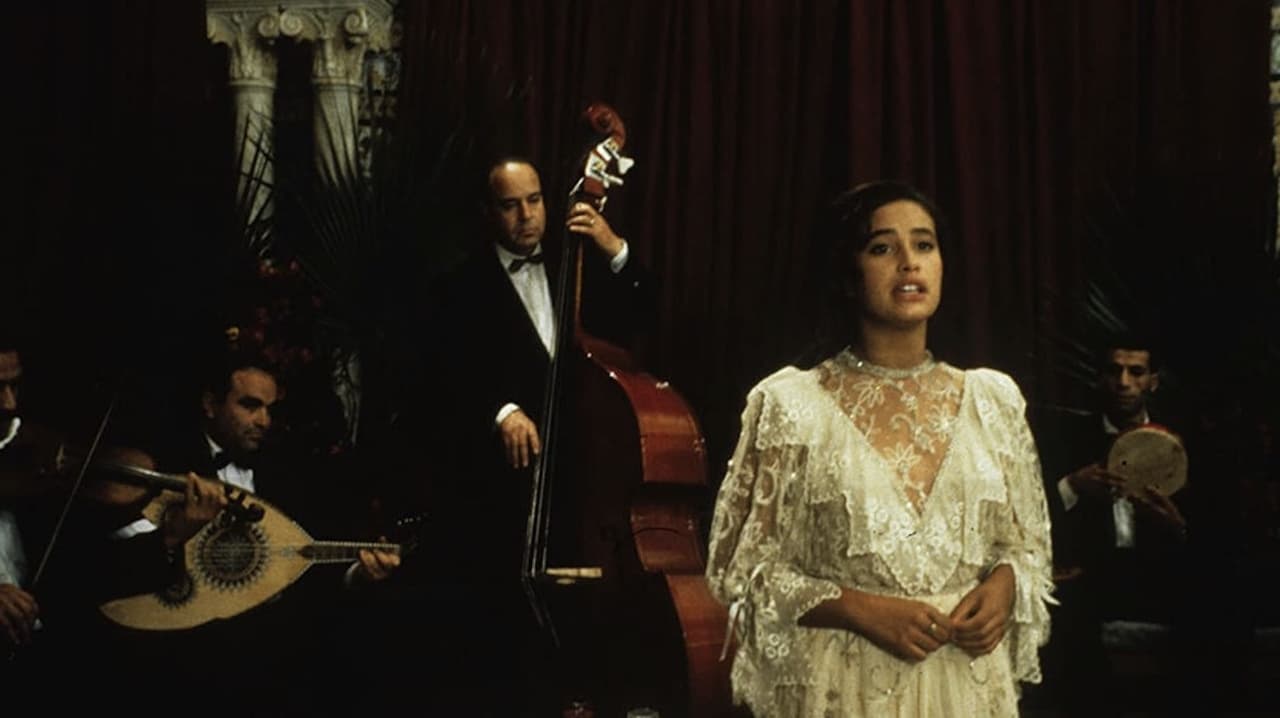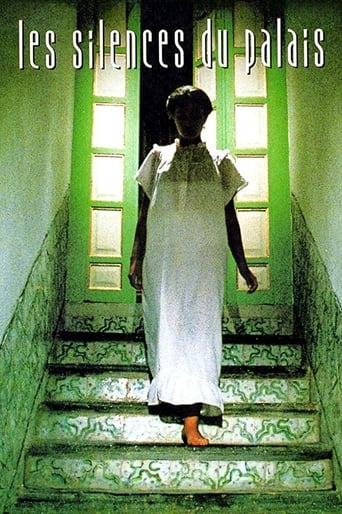

Self-important, over-dramatic, uninspired.
... View MoreFar from Perfect, Far from Terrible
... View MoreThe acting is good, and the firecracker script has some excellent ideas.
... View MoreThe tone of this movie is interesting -- the stakes are both dramatic and high, but it's balanced with a lot of fun, tongue and cheek dialogue.
... View MoreLet us begin by discussing this film's title "The Silences of the Palace".This catchy title is an absolute misnomer as in real terms there are no silences in the palaces.Most of the palaces featured in the film are full of sounds but a feeling of silence is deliberately implied as there is no one willing to hear these sounds.Moufida Tlatli is an important name in the realm of both Arab as well as Tunisian cinema.She finished her cinema studies at famous French film institute IDHEC.Many famous Arab films bear her name as she did editing work for many prominent Arab film makers.Her debut film "The Silences of the Palace" is about the last days of Tunisian aristocracy.It was a time of confusion as Tunisian rulers were worried about their fate as the nation was looking forward to an imminent freedom.As portrayed in this film the plight of the common people including women has not changed as they are being continually forced to remain in silence.Moufida Tlatli dedicated this film to her mother who was a constant source of inspiration to her while she was drafting this film.If a list of best Arab films is drafted,this film by Moufida Tlatli will surely be there.
... View MoreThis film is a powerful story about economic and sexual oppression, and is equally interesting as a sort of history of underrepresented people during the French occupation as it is a comment on women's rights in Tunisia. I don't like what the commenter from Germany said- 'best film made in the Arab world wouldn't be a difficult superlative to obtain'? There are many great films that have been made in the Arab world, and whatever else you said about the film is worthless to me when you make that kind of statement because it tells me how many of the great Arab films you must have seen to judge it by- not many. I would agree, it is without doubt one of the best Arab films I've seen- but I would have to see literally thousands of Arab films before I could be comfortable making such an outrageous generalization.
... View More-THE WOMAN SERVANTSThe women working in the palace of the last Bey are united in their situation. Their main duty being the upkeep of the house and the preparation of meals, they also serve as sexual servants to the princes. From the outside, then, the palace is a revered place of grandeur and importance; on the inside, however, we see a harem of clandestine activity and unspoken shame. These are the 'silences' referred to in the film's title.We get a good impression of the women's tiring and monotonous work maintaining the palace, although Tlatli also places considerable focus upon their role as sexual servants, as it is so destructive to the morale of the women, robbing them of identity and self-worth. The servants are cut off from the outside world and therefore unable to improve their situation - we hear how one servant's cousin came to visit her at the palace but was turned away. The women are prisoners of the palace, having no life beyond its walls.-THE NATIONALIST MOVEMENT AND ITS EFFECT ON THE SERVANTSThe film is set at a time of great political and social uncertainty. Tunisian independence is imminent, and a quick transfer of authority from the French to the Tunisian government - as happened in some other Maghreb countries - will undoubtedly lead to sudden and drastic changes in Tunisian society.The women of the palace listen to news bulletins about the nationalist movement whenever they can. On one hand, they do not feel directly affected by it due to their insular existence within the palace walls: their detached world within the palace gives them a sense of security, just like long-serving prison inmates. On the other hand, the nationalist movement carries optimism for the women: it is the only source of hope for eventual liberation from their pitiful situation. With no legal status or identity, the servants are not even recognised members of society.-KHADIJA AND ALIAWe see numerous examples of the frustration and despair that the women suffer throughout the film. Khadija, Alia's mother, has lived and worked as a servant to the Beys - and as a sexual slave to Sidi Ali - for her whole life. She cannot leave as she has nowhere else to go. She places all her hopes for the future in her daughter. As Alia grows up, Khadija fears for her daughter's safety against the sexual desires of her masters. She is desperate for Alia to avoid the suffering that she has lived with, and therefore nourishes her daughter's ability and enthusiasm for music, in the hope of liberating Alia. Khadija puts her small earnings towards the purchase of a lute.Alia has an independent spirit, which most clearly manifests itself in her love for singing and playing the lute. We are made to feel optimistic for Alia as she grows up. She develops hope in the nationalist movement through her teacher (and later her lover) Lotfi. Unlike her mother before her, Alia has a belief that she must withstand the pressures imposed upon her by her situation in the palace. Her personal struggle is, however, ultimately tragic: we see her at the end having lost confidence in her music and in herself, due in part to her tragic miscarriage.Portraying the women of the palace as she does - and particularly through the character of Alia - Tlatli draws upon a need for Tunisian women to come to terms with the pains of the past. By constructing a scenario whereby Alia relives the painful memories of her childhood by revisiting Khalti Hadda and the deserted palace, Tlatli underlines the repression that women suffer. Without coming to terms with their personal trauma and tragedy, Tunisian women cannot improve their status, despite the nation's independence and political stability.
... View MoreThe best film ever made in the Arab World really isn't a superlative that would be difficult to attain, but this film is really a masterwork.Aliya a singer with an superb voice but little success is invited to the palace where she spent her childhood as the daughter of a servant. She never really got to know who her father was, that she has been invited back to the palace after the head of the household, member of the Turkish ruling family of pre-independence Tunisia has died is no accident.Back in the palace all her childhood memories come back to Alia. She remembers her mother being the concubine of the deceased. His wife was barren, and she becomes sure that she is his daughter.She also remembers how her love for music helped her to gain prestige in the palace. But the songs she sang were not just entertainment. The melodies of Umm Kulthum were broadcasted by Radio Cairo to spread the message of Arab awakening and the longing for independence. Albeit its political aspects also the ruling family, a puppet on the strings of the French, enjoys the music. But for the masses the songs also become a symbol for the longing for freedom. falls in love with one student who is an independence activist. He is hiding in the palace where his aunt is another servant. He promises her a brilliant future but already at the beginning of the film we are told that the promise was not to be kept.The film is a ingenious ridiculization of political rhetoric and seldom ever has Oriental music bee integrated in a film so brilliantly (except perhaps Ray's Jalsaghar). You will enjoy it even if Arab music doesn't mean anything to you.
... View More